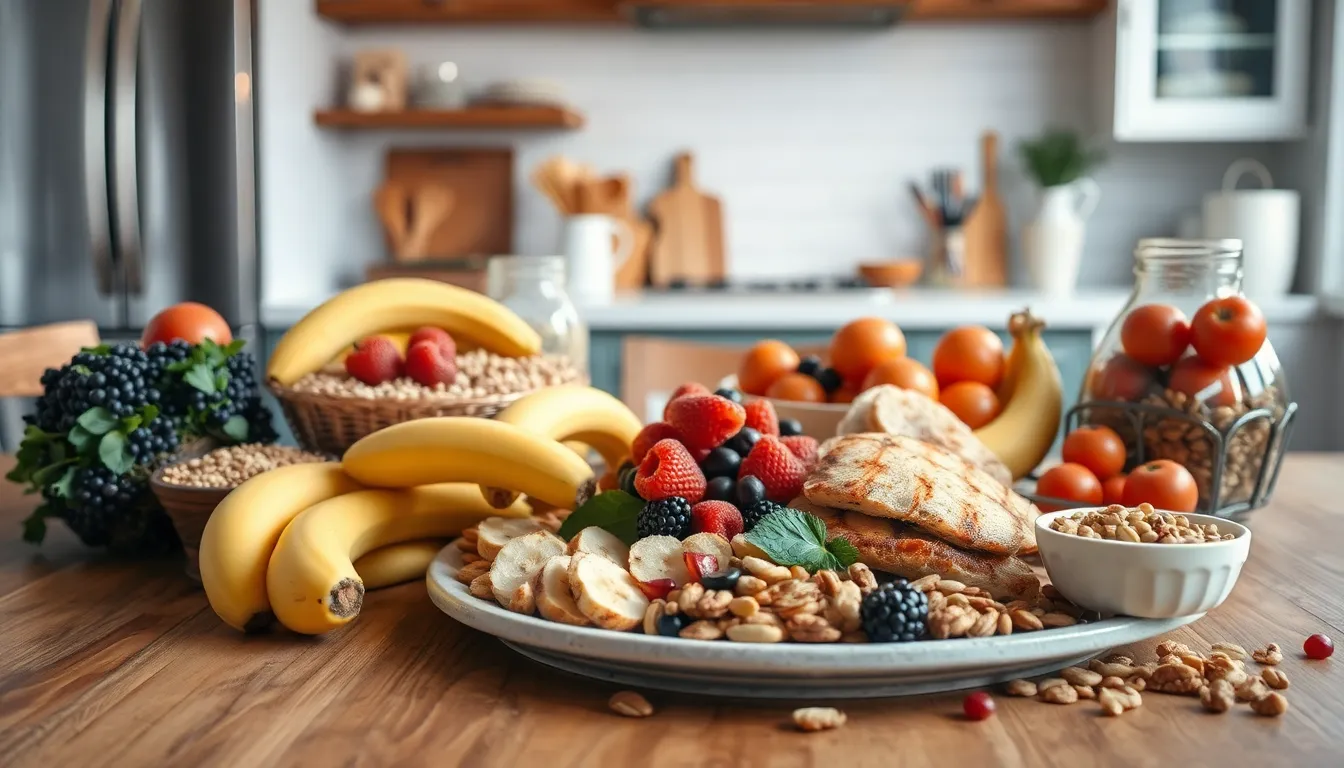Table of Contents
ToggleFeeling like a sloth after lunch? You’re not alone. Many people struggle with the dreaded afternoon slump, where energy levels plummet faster than a lead balloon. But what if the secret to staying energized all day lies in the food they eat? That’s right! The right energy-boosting foods can transform anyone from a sluggish couch potato into a high-octane dynamo ready to conquer the world—or at least finish that work project.
What Are Energy Boosting Foods?
Energy boosting foods are those that provide sustained energy, enhancing both physical and mental performance. These foods contain nutrients that support metabolism, regulate blood sugar levels, and offer essential vitamins and minerals.
Whole grains like oats and quinoa serve as excellent sources of complex carbohydrates. They digest slowly, releasing energy steadily throughout the day. Fruits, particularly bananas and berries, also contribute significantly. Rich in vitamins, antioxidants, and natural sugars, fruits help combat fatigue and provide quick energy.
Incorporating nuts and seeds into meals can further enhance energy levels. Almonds and walnuts offer healthy fats, protein, and fiber, all crucial for maintaining consistent energy. Leafy greens like spinach are nutrient-dense options, filled with iron and magnesium, known to support energy production in the body.
Lean proteins such as chicken and fish provide essential amino acids for muscle repair and maintenance. These proteins contribute to increased energy levels, especially when consumed during meals or snacks. Additionally, legumes like lentils and chickpeas are high in protein and fiber, making them impressive energy-boosters.
Choosing foods that combine macronutrients also proves beneficial. For example, a snack consisting of Greek yogurt topped with fruits and nuts combines carbohydrates, protein, and healthy fats efficiently, providing lasting energy.
Opting for hydration also plays a vital role in maintaining energy. Dehydration leads to fatigue; therefore, consuming water-rich foods or adequate fluids helps sustain energy levels. Remember, balancing these food choices throughout the day ensures a steady source of energy, positively impacting productivity and overall well-being.
Benefits of Energy Boosting Foods

Energy-boosting foods provide significant benefits, contributing to improved physical performance and enhanced mental clarity.
Improved Physical Performance
Increased stamina results from consuming energy-boosting foods. Whole grains, for example, release glucose gradually, supporting endurance activities. Lean proteins, like chicken and fish, aid in muscle recovery, enhancing workout efficiency. Including nuts and seeds enables sustained energy during workouts, minimizing fatigue. Consuming fruits, particularly bananas, can provide a quick energy source before or after exercise. Proper hydration, as noted earlier, supports optimal physical performance, preventing dehydration-related fatigue. These dietary choices directly impact physical capabilities, allowing individuals to perform better during activities.
Enhanced Mental Clarity
Mental clarity significantly improves with the right energy-boosting foods. Nutrient-rich options, such as leafy greens, support cognitive function and memory. Essential fatty acids found in fish, specifically omega-3s, also contribute to better brain health. Consuming fruits like berries helps reduce oxidative stress, which improved focus and concentration. Balanced meals that include a mix of macronutrients provide a steady supply of energy, preventing energy crashes. Regular intake of legumes, such as lentils and chickpeas, offers both fiber and protein, further sustaining mental performance throughout the day. These energy-enhancing foods create a foundation for optimal cognitive function.
Top Energy Boosting Foods
Energy-boosting foods play a crucial role in sustaining energy and enhancing productivity throughout the day. Various categories of foods can provide necessary nutrients to combat fatigue.
Whole Grains
Whole grains are excellent sources of energy. Foods like oats and quinoa release glucose gradually, which helps maintain consistent energy levels. Eating whole grains for breakfast fuels the body throughout the day. Combining whole grains with other food groups enhances their benefits. For instance, pairing oatmeal with berries and nuts creates a nutrient-rich meal that promotes sustained energy.
Nuts and Seeds
Nuts and seeds deliver healthy fats, protein, and fiber. Almonds, walnuts, and chia seeds provide sustained energy during physical activities. Snacking on a handful of these can prevent energy crashes. Hydrating seeds like pumpkin seeds also contribute important minerals, supporting overall well-being. Including nuts and seeds in salads and dishes contributes valuable nutrients that prolong energy.
Fruits and Vegetables
Fruits and vegetables offer vital vitamins and minerals. Bananas supply quick energy thanks to their natural sugars and carbohydrates. Berries and leafy greens help reduce oxidative stress while enhancing cognitive function. Including a variety of colorful fruits and vegetables in meals maximizes nutrient intake. Snack options like carrot sticks with hummus or an apple with nut butter boost energy and satisfaction.
Lean Proteins
Lean proteins are vital for muscle repair and energy maintenance. Chicken, fish, and legumes provide necessary amino acids. Consuming lean protein at every meal supports endurance during physical activities. These proteins help in maintaining muscle mass, which is important for overall fitness. Pairing lean proteins with healthy carbohydrates ensures an optimal energy source throughout the day.
Superfoods
Superfoods stand out for their exceptional nutrient density. Quinoa, kale, and blueberries offer high levels of antioxidants, vitamins, and minerals. Incorporating these foods into daily meals elevates health and energy levels. Superfoods like chia seeds also provide omega-3 fatty acids, promoting brain health. Utilizing superfoods in smoothies, salads, or bowls boosts nutrient intake and overall vitality.
How to Incorporate Energy Boosting Foods into Your Diet
Incorporating energy-boosting foods into daily meals enhances productivity and sustains energy levels.
Meal Planning Tips
Start by including whole grains such as oats and quinoa in breakfast meals. Pair lean proteins like chicken or fish with vegetables during lunch. Adding a variety of colorful fruits and leafy greens ensures essential vitamins and minerals enrich the diet. Create balanced meals by combining carbohydrates, proteins, and healthy fats, so energy remains steady throughout the day. Preparing meals in advance allows individuals to stick to energy-rich options rather than opting for quick, less nutritious choices. Utilize storage containers to keep prepared meals fresh, making it easier to grab foods that fuel the body effectively.
Snack Ideas
Opt for snacks that provide quick energy without crashes. Greek yogurt topped with berries offers a protein-rich option, while nuts and seeds deliver healthy fats and fiber. Incorporating sliced fruits like apples or bananas adds natural sweetness and immediate energy. Smoothies made with spinach, fruits, and nut butter serve as a nutrient-dense choice, especially for those on-the-go. Preparing energy bars with oats and nuts creates a satisfying snack that boosts energy efficiently. Keep various snacks readily available to encourage healthy munching throughout the day, ensuring energy levels remain high.
Incorporating energy-boosting foods into daily diets can transform how individuals feel throughout the day. By prioritizing whole grains lean proteins fruits and vegetables they can maintain steady energy levels and enhance productivity. Creating balanced meals and snacks that combine these nutrient-rich foods is essential for preventing energy crashes and supporting both physical and mental performance.
Hydration also plays a key role in sustaining energy so it’s important to drink plenty of water. With thoughtful meal planning and preparation individuals can easily access the nutrients they need to stay energized and focused. Embracing these dietary changes not only improves immediate energy levels but also contributes to overall health and well-being.






